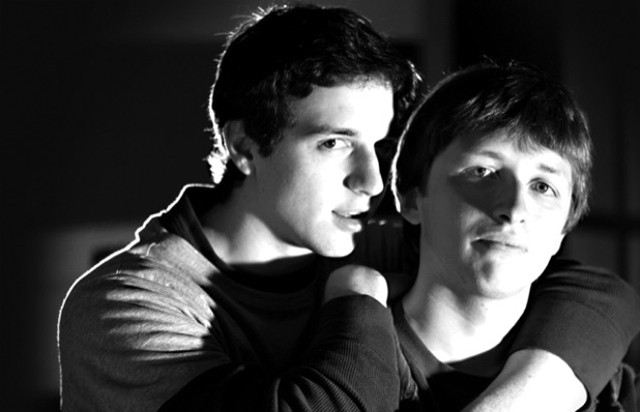Published December 28, 2011 at 9:45 a.m.
When Burlington playwright James Lantz took his play The Bus on the road this past autumn, some of his supporters expressed concern over how the work would be received out of town. But snarky city critics were the least of their worries. It was Lantz’s decision to stage the play — a poignant tale of homophobia and intolerance — as close as possible to the Westboro Baptist Church of Topeka, Kan., that sounded risky to the point of reckless. The WBC enjoys a national reputation for virulent antigay protests, including a 2000 visit to Vermont at the height of the civil-unions debate. But Lantz, who had been compelled to restart The Bus by a spate of gay teen suicides that made headlines in 2010, was undeterred.
“As a parent, I couldn’t handle sitting on the sidelines anymore,” he says. “I knew that The Bus had been warmly embraced in Burlington [in 2006], so I pulled it out of the drawer.”
Lantz also fired up his computer and began raising money through Kickstarter, a fundraising website that involves meeting goals on set deadlines. The first effort failed, but a second campaign came through to the tune of roughly $50,000. And The Bus pulled away.
Lantz and company’s first stop was New York City, where the show’s cast solidified under the direction of John Simpkins. The Bus ran for four weeks in October at the off-Broadway venue 59E59 Theaters. The play garnered good publicity and generally receptive audiences in the Big Apple, but Lantz also remembers getting “stung” a few times by critics. He also recalls the “dressing down” he received from a teacher at an elite, all-girls prep school on the Upper West Side, where he and his crew appeared by invitation, over his decision to take the show to Kansas.
Now, some 3000 miles, $100,000 in costs, four weeks off Broadway and four Kansas performances later, Lantz is reflecting on a theatrical run he calls “nothing short of a religious experience.” The tour involved driving the show’s set, designed by Michael Schweikardt, all the way to Kansas and back to Vermont. Under Simpkins’ direction, The Bus closed on December 10 in Topeka, where Nate Phelps, the estranged son of infamous WBC pastor Fred Phelps, facilitated post-show talk back sessions.
The Kansas shows were also remarkable, Lantz notes, for drawing together religious believers, nonbelievers, gay people and straight people. “I didn’t want the play to preach to the choir,” he says. “It was fascinating to take the play to the heart of its drama — literally … These people are right on the front lines.”
An email dispatch from the production’s Kickstarter campaign mentions “a mother whose son died of AIDS, parents who came to ‘understand,’” and “students who drove up to three hours to see our show.”
Lantz estimates that turnout for the talk backs was in the neighborhood of 90 percent of the audience. A recurring theme in these exchanges: Kansans’ insistence that the WBC not only doesn’t represent their beliefs and values but that the church’s hate mongering has actually fostered a more tolerant community.
The response to The Bus has left Lantz feeling profoundly “humbled” but “hell-bent” on keeping his creative wheels turning. He says that the play’s productions have generated interest for more of them in the heartland — Oklahoma and Nebraska — as well as in San Francisco, London and South Africa. The playwright is “cautiously optimistic” about whether The Bus will roll on. In any event, Lantz says he wants to “proselytize” to other thespians about reaching new audiences while he ponders what his latest Bus trip has taught him.
Some of these lessons have to do with using art to advance a cause — and vice versa. “The minute that there was a cause behind this,” Lantz recalls, “people became backers of the project. Doors opened for us.”
Another lesson is more personal: “Along the way to Kansas, I learned some things about my tribe, about my people on this side of the fence, about my own prejudices of Kansas,” he says. “And I have some work to do.”
More By This Author
Speaking of...
-

Executive Director Kurt Thoma Leaves Barre Opera House
Mar 5, 2024 -

Vermonter's Musical Bound for Broadway With Hillary Clinton as a Producer
Oct 25, 2023 -

Phantom Theater Finds New Winter Venue in Waitsfield
Oct 13, 2023 -

Double E 2023 Summer Concert Series Kicks Off With the Wailers
Mar 17, 2023 -

Off Center for the Dramatic Arts to Reopen in the New North End
Sep 23, 2022 - More »
Comments
Comments are closed.
From 2014-2020, Seven Days allowed readers to comment on all stories posted on our website. While we've appreciated the suggestions and insights, right now Seven Days is prioritizing our core mission — producing high-quality, responsible local journalism — over moderating online debates between readers.
To criticize, correct or praise our reporting, please send us a letter to the editor or send us a tip. We’ll check it out and report the results.
Online comments may return when we have better tech tools for managing them. Thanks for reading.















































